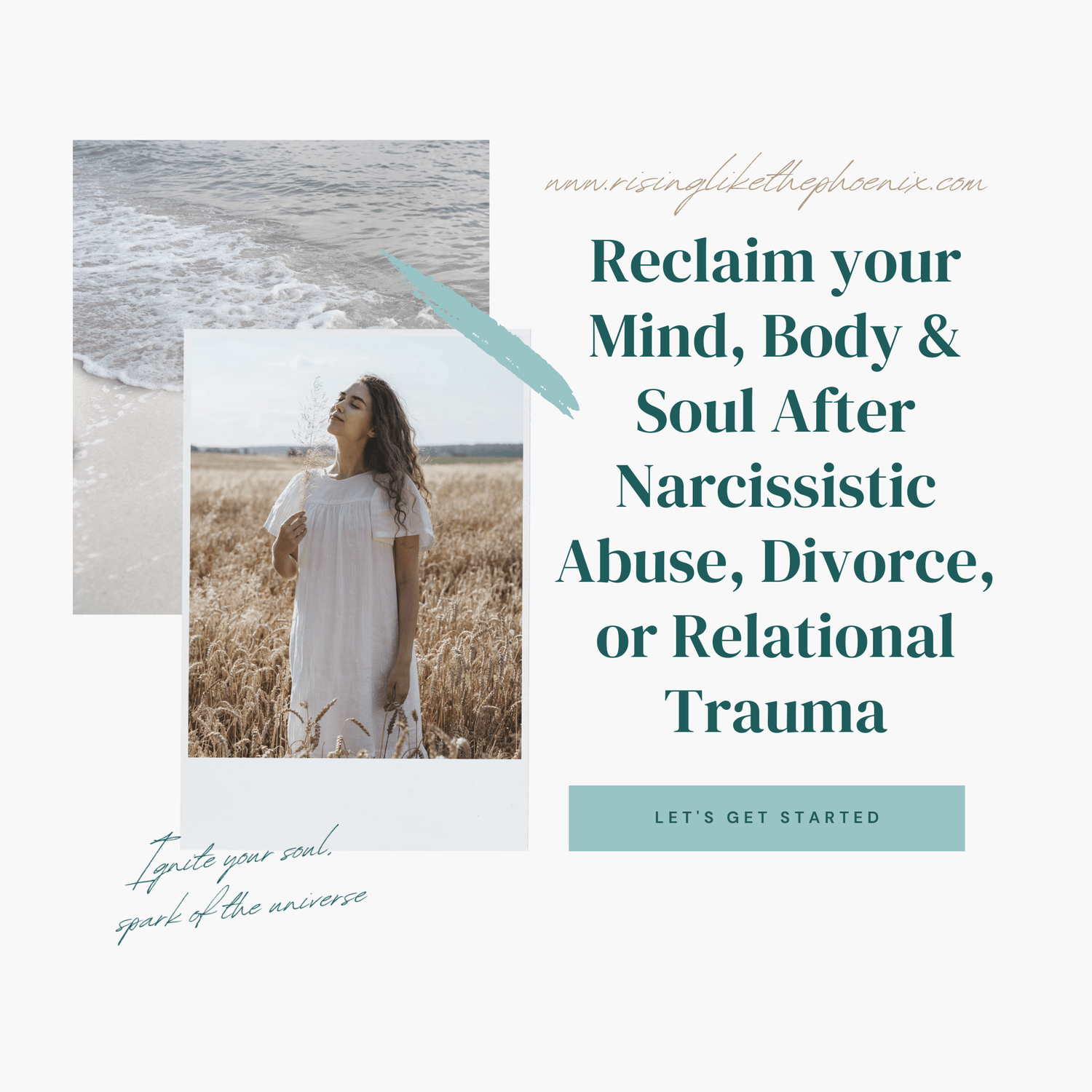The Power of Mindfulness in Overcoming Narcissistic Abuse
If you've experienced narcissistic abuse, you know it leaves deep, often invisible wounds, on your mind, your body, and your soul. You may find yourself second-guessing reality, struggling with anxiety, or feeling emotionally numb. But there is a gentle, powerful practice that can support your healing journey: mindfulness.
Mindfulness isn’t just a trendy wellness buzzword. It’s a grounded, research-backed tool that helps survivors of relationship trauma reclaim their sense of self, rebuild self-worth, and gently move toward emotional healing. In this blog, we’ll explore how mindfulness can help you navigate the fog left by gaslighting, release pain from toxic relationships, and rewire your brain toward peace and presence.
What Is Mindfulness?
Mindfulness is the practice of bringing your attention to the present moment, without judgment, without trying to fix or escape it. It’s about noticing your thoughts, emotions, and physical sensations with curiosity and compassion. At its core, mindfulness invites us to be with what is, gently, courageously, and with self-awareness.
For survivors of narcissistic abuse, this can be life-changing. Narcissistic relationships often condition us to ignore our own needs, to doubt our inner voice, and to live in a state of chronic fight-or-flight. Mindfulness helps you reclaim your inner authority and return home to yourself.
How Narcissistic Abuse Impacts the Mind and Body
Before we explore how mindfulness helps, it’s essential to understand what narcissistic abuse does to the nervous system. Whether it came from a romantic partner, parent, or other close relationship, the effects are real,and they’re more than emotional.
Narcissists often use manipulation tactics like gaslighting, silent treatment, blame-shifting, and love bombing to control and confuse their target. Over time, these behaviors create:
Hypervigilance (always waiting for the next outburst)
Anxiety and depression
Memory problems or “brain fog”
Chronic fatigue
Low self-worth
Disconnection from your own needs and truth
You may have lived in survival mode for months or years. This is why mindfulness isn’t just a nice practice, it’s a lifeline. It helps you slow down, breathe deeply, and reestablish safety in your own body. See: https://www.harvard.health.edu/topics/mind-and-mood

The Healing Journey: Why Mindfulness Matters
Healing from relationship trauma is not a straight line. You may feel progress one day and despair the next. That’s normal. But mindfulness helps you anchor yourself in the present so that you’re not swept away by overwhelming emotions or old trauma loops.
Here’s how mindfulness supports your narcissistic abuse recovery:
1. Rebuilds Self-Worth
Mindfulness invites you to witness your thoughts without judgment. Over time, you start noticing how often you speak to yourself with harshness or self-doubt. As you observe these thoughts with compassion, you can begin to rewrite your inner narrative, and reclaim your inherent worth.
2. Rewires the Brain
Mindfulness has been shown in neuroscience research to strengthen the prefrontal cortex (the part of your brain responsible for decision-making and self-regulation) and calm the amygdala (your fear center). With consistent practice, your brain becomes less reactive and more resilient.
3. Interrupts the Gaslighting Spiral
One of the most devastating effects of narcissistic abuse is losing your grip on reality. Mindfulness brings you back to your own lived experience. When you pause and breathe, you remember: I am here. I feel this. My truth matters.
4. Regulates the Nervous System
Survivors often live in a prolonged state of dysregulation, toggling between anxiety, shutdown, and emotional numbness. Mindful breathing, body scans, and grounding techniques help shift your body into “rest and digest” mode, where true healing happens.
5. Improves Emotional Resilience
Rather than avoiding difficult emotions (as many of us were conditioned to do), mindfulness teaches you to sit with discomfort without being consumed by it. You develop the strength to feel grief, rage, fear,and let them move through you.
Simple Mindfulness Practices for Survivors
You don’t need to meditate for an hour to experience the benefits of mindfulness. In fact, small, consistent moments of presence are often more powerful for trauma survivors. Here are a few self-care tips to help you start:

✧ The Grounding Breath
Sit or stand with your feet on the floor. Inhale slowly for a count of four, hold for four, and exhale for six. Do this for three cycles. Whisper to yourself; I am safe. I am here. I am enough.
✧ Name It to Tame It
When strong emotions arise, try saying out loud what you’re feeling: “This is anxiety.” “This is grief.” By naming it, you create space between yourself and the emotion.
✧ The Five Senses Check-In
Pause and notice: What are five things you can see, four things you can touch, three things you can hear, two things you can smell, one thing you can taste? This quick tool brings you back to the now.
✧ Loving-Kindness Meditation
Close your eyes and say: May I be safe. May I be free. May I heal. May I know my worth. Over time, you can extend this blessing to your past self, your future self, and even those who harmed you,if and when you feel ready.
From Surviving to Thriving: Recovery Steps with Mindfulness
Once you’ve stabilized and created safety within, you can begin to gently move forward with your healing journey. Mindfulness helps you:
Identify your emotional needs
Set healthy boundaries
Trust your intuition again
Make empowered decisions
Cultivate joy and gratitude
The goal isn’t perfection. It’s presence. With each mindful step, you rebuild your life, not around the wounds of the past, but around the wisdom of your soul.
A Note on Compassion:
If you find mindfulness difficult at first, that’s okay. Many survivors do. Sometimes sitting still can feel triggering after trauma. You don’t need to force anything. Choose the practices that feel grounding, supportive, and safe. Let your journey unfold at your pace.
You are not broken. You are healing. And mindfulness is a gentle, loyal companion on the path to wholeness.
For further information see: https://verywellmind.com/the-benefits-of-mindfulness-5205137
FAQ: Mindfulness & Narcissistic Abuse Recovery
Mindfulness is a powerful tool, but not a replacement for professional support. Many survivors benefit from trauma-informed therapy and coaching in addition to mindfulness practices.
This is a common experience. Trauma often lives in the body, and slowing down can initially surface intense emotions. Start small, focus on grounding techniques, and consider working with a therapist if needed.
Yes. Grounding practices like deep breathing, sensory awareness, and present-moment focus can reduce the intensity of triggers and help you respond rather than react.
Even 2–5 minutes a day can make a difference. The key is consistency. Build a gentle routine that works for you and adapt as needed.
Final Thoughts
The path to healing from narcissistic abuse isn’t easy, but it’s deeply possible. Through mindfulness, you can anchor yourself in the truth of who you are: strong, worthy, and deeply alive. Let mindfulness be your inner compass, pointing you toward peace, clarity, and freedom.
You’re not alone. You’re rising.
GET YOUR FREE GIFT!
5 Steps to Reclaim Your Life
A practical guide to reclaiming your confidence, setting boundaries, and moving forward—without second-guessing yourself.
Categories
Rise Weekly Newsletter
Because healing isn’t just about surviving, it’s about rising. Rise Weekly delivers empowering insights, gentle reminders, and soulful tools to help you reclaim your strength, set powerful boundaries, and rebuild a life that feels like you. If you're ready to rise above trauma and step into your next chapter with clarity and courage - this is your space.
Created by © Suzanne Startari with systeme.io





